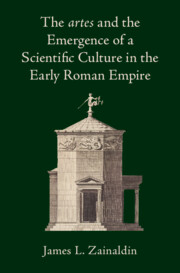Book contents
- The Artes and the Emergence of a Scientific Culture in the Early Roman Empire
- The Artes and the Emergence of a Scientific Culture in the Early Roman Empire
- Copyright page
- Dedication
- Contents
- Figures
- Tables
- Acknowledgments
- Note on Texts and Abbreviations
- Introduction The Idea of the artes
- Part I
- Part II
- Chapter 3 The Architectonic ars of Architecture: Explanation and Method in Vitruvius’ De architectura
- Chapter 4 Columella and the New Roman Agronomy
- Part III
- Part IV
- Appendix: Some Connections between Republican and Early Imperial artes
- References
- Index Locorum
- Index of Greek and Latin Words (Index Verborum)
- General Index (Index Nominum et Rerum)
Chapter 4 - Columella and the New Roman Agronomy
The Art of Agriculture and Knowledge of Nature in Res rustica
from Part II
Published online by Cambridge University Press: 22 March 2025
- The Artes and the Emergence of a Scientific Culture in the Early Roman Empire
- The Artes and the Emergence of a Scientific Culture in the Early Roman Empire
- Copyright page
- Dedication
- Contents
- Figures
- Tables
- Acknowledgments
- Note on Texts and Abbreviations
- Introduction The Idea of the artes
- Part I
- Part II
- Chapter 3 The Architectonic ars of Architecture: Explanation and Method in Vitruvius’ De architectura
- Chapter 4 Columella and the New Roman Agronomy
- Part III
- Part IV
- Appendix: Some Connections between Republican and Early Imperial artes
- References
- Index Locorum
- Index of Greek and Latin Words (Index Verborum)
- General Index (Index Nominum et Rerum)
Summary
Columella wrote his Res rustica (c. AD 60/1–5) in the wake of a well-developed Roman tradition of agricultural writing. His approach to the ars distinguishes him from Republican predecessors such as Cato and Varro, however, and reflects the scientific culture of the artes of the early Empire. Columella presents agriculture as an august discipline requiring broad, interdisciplinary knowledge and theoretical understanding of nature. Depreciatory views of agriculture, imputed to other Romans, are explained as resulting from moral decline that has led to ignorance of correct technique. Columella’s discussions of manuring (Book II) and vine propagation (Book III) are shaped by his scientific conception of ars, as he argues that close appreciation of the principles of plant life provides the foundation for good agronomy. Columella’s treatise is not only the preeminent work of agronomy from Greco-Roman antiquity but also witness to the vibrant scientific culture of the artes.
- Type
- Chapter
- Information
- Publisher: Cambridge University PressPrint publication year: 2025

